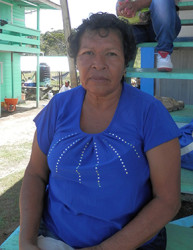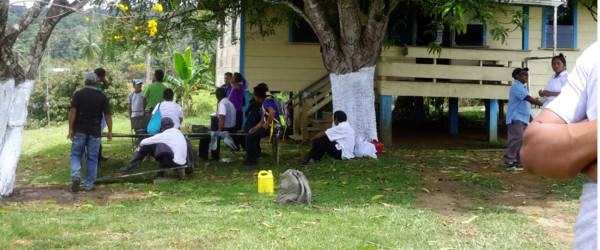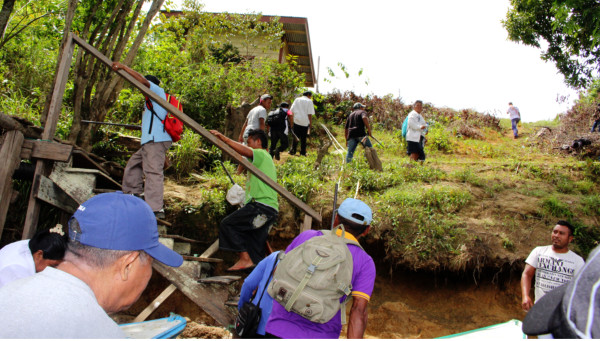He stood outside the Kamarang Police Station, no longer the smiling man he was a day earlier. “Can’t hunt for lil food now,” Jeremy* said, his attempt at a smile more of a grimace. His wife, solemn, stood silently by his side.
Over the past few weeks, dozens of indigenous families in the Upper Mazaruni grappled with whether to surrender their shotguns to the police under the gun amnesty programme which began on September 1 and which was due to end on September 30. (It has since been extended to October 14.) They have since turned in the most firearms from across Guyana with 115 shotguns out of 121 surrendered to the police by September 30 coming from interior regions.
Dozens have made journeys of miles, travelling through thick jungle and spending days on rivers to reach the Kamarang Police Station where dozens of shotguns have been surrendered. For many, it was a tough decision and they now wonder about their livelihood even as they hope that their applications for gun licences will be approved.

“We don’t have no employment. What will we eat? What will our children eat?” one man questioned.
“The use of the gun was what provided our meat,” one distressed woman said.
Last week, Stabroek News accompanied several villagers from Jawalla and observed the process as they surrendered their shotguns at the Kamarang Police Station. In a series of interviews, including with persons from other Upper Mazaruni communities who gave up their guns, many expressed concern over the impact to their livelihoods.
Those interviewed in-cluded men who surrendered their shotguns and some of their wives who accompanied them. For some, the shotguns had been in their families for decades. In one village, some residents had traded dogs trained to hunt, for shotguns from other in-digenous persons in neighbouring Brazil. They em-phasised that they do not use the shotguns to commit crimes but to protect their crops from wild animals and for hunting to obtain food for their families or to sell the meat so that they could obtain money for their children in school.
“We can’t live without gun. We supporting we children with meat to Jawalla. We get cash for the meat and we supporting we children with that,” a woman from Phillipai said. “We are not criminals with the gun. We are not shooting people. We don’t have market, we don’t have cash too at the same time,” she added.
In the Upper Mazaruni, there are no roads. Amerindians from the indigenous villages in this part of Region Seven travel mainly by river in enormous dug-out canoes using outboard engines and tiny woodskin canoes using paddles. The ones who have gained as a result of gold mining have speedboats but the majority do not.
Many use their shotguns to hunt in the jungle and to protect their crops and poultry from wildlife. However, most of the shotguns are unlicensed and fearing the huge fines and long jail time, many have decided to turn in their weapons under the amnes-ty programme. But the information they have received is conflicting.
Many of those who surrendered their guns, also applied for gun licences at the same time. Apart from that, the police at Kamarang also recorded the guns’ serial numbers and the names of the persons who turned them in while also taking photocopies of their national identification cards.
Several said that they were told that their applications for gun licences would be given priority and also believe that they would be able to get back the same guns they surrendered once their application is approved.
However, Minister of Public Security Khemraj Ramjattan, when contacted, told Stabroek News, that the applications would not be given priority. He also said that under the amnesty, no names are supposed to be recorded when the guns are surrendered. “That is not supposed to happen,” he said. “You just hand it over, no names.” He suggested that maybe the police at Kamarang are not quite au fait with the process and said he would ask the divisional commander about the matter.
In relation to the applications, the minister said that the applicants from those areas will go through the same process like every other applicant. He said that once they send in their applications, and they have no criminal record and are of good character, in addition to fulfilling the other requirements, “they will get it, absolutely.”
Some persons said that they applied years before but never got a response and Ramjattan pledged that this will be rectified. He noted that he had not seen the applications and would like to see them and would follow up on the matter.
According to the minister, he would “love to help” indigenous people in relation to getting firearms as he had pledged at the National Toshaos Confer-ence. He emphasised that they have to fulfil the standard requirements like any other applicant.
For Jeremy, his shotgun was his livelihood; it was how he fed his family. He said that he had it for 24 years and was given it by his father who modified it and taught him to shoot. “I like the gun, I sorry for it,” he said. “I cried for it,” he confessed after a pause.

In Jawalla, one woman walking with her husband to turn in his gun on Tuesday, said that she felt like crying. That day, 12 shotguns from Jawalla were turned in to the police. Some were handed over in the days prior. From other villages, some persons travelled as much as two days, sleeping on the river, to get to Kamarang.
Ken*, a Jawalla resident, said that many years ago, there was a gun amnesty and those who turned in their guns were able to get licenses for the firearm. “To me, musse the same thing happening with the new government now,” he said. However, he was concerned about the impact on the people.
“That is how we living,” he said. “Hunting, that is the Amerindian way of life.” He was concerned that many would be unable to provide for their families and also pointed out that not everyone in the village owned guns and those who didn’t would usually obtain food from the hunters. “They gon left without,” he said. “Not all of us are hunters, not all of us are teachers” or government employees…”the majority of the people, they living by hunting, fishing,” he said.
The man also argued that the gun crimes were occurring on the coastland and not in their area. He also pointed out that the time it takes to process applications is too long. “We apply yes but the processing is too long. Why?” Williams questioned.
One man said that he used his shotgun to hunt and also protect his poultry from foxes and other wildlife. He said that he used to do poultry rearing but foxes and chicken hawks ended the venture. He said that if he was able to get back a gun, he would restart poultry rearing. He handed in his shotgun a week ago. “I can’t do nothing now,” he said while indicating that he was waiting for his application to be approved.
In the Upper Mazaruni, meat is expensive and in Jawalla, a pound of fish sells for $1,200 and the minimum price for a pound of chicken is $1,500 but it can be more. Other meats including wild meat are even more expensive and many hunt and sell the wild meat to miners or others who can afford and thus are able to get money and support their families.
Huntsmen
Hunters play a crucial role in the indigenous communities of the Upper Mazaruni. “For now, my concern is…how many people are coming out with their illegal firearms like how we are,” said Norma Thomas, the toshao of Kamarang.
“We don’t have these firearms to shoot criminals or shoot one another. We have these illegal firearms to defend our crops, our farm from the wild animals that attack our farms. This is what we use it for, and for hunting. All like now it gon be a failure for me in Kamarang. Those are my huntsmen that I use Heritage or Mashramani time, send out huntsmen but it will be a little failure for me now because [these] are my very huntsmen that I’ve been using and now they surrender their firearm,” she said as she recalled accompanying four men from Kamarang who surrendered their shotguns.
“They even ask me now, in the event during the period now that they give up their firearm and the wild animals attack their farm, what do we do? Would the government supply them because our crops take one year, bitter cassava take one year to [mature],” she said. “They are asking me during this process would the government help them and feed them until they get back another farm.”

The indigenous leader, who is an executive member of the National Toshaos Council, said that many of the questions, she was unable to answer. She also noted that there is a great deal of uncertainty as to whether applications will be approved but the police officer had told them that they were honest and if they apply now for gun licences, priority will be given to them.
Thomas said that two Fridays ago, she accompanied 24 men from Chinoweng as they turned in their shotguns. “That’s their living, that’s their livelihood, that wasn’t there to shoot one another,” she said.
The indigenous leader recalled that at the beginning of the amnesty, she held a public meeting where a police officer spoke on the issue. He said that a priest or pastor had to be present when the villagers were surrendering their firearm. Thomas said that the first time, they were accompanied by an Anglican priest and the officer explained that they were asked not to ask questions such as where the men purchased the guns but the ranks collected identification information. “All they want is their ID cards, their name, their address and they collect the gun and they write down the number,” Thomas recalled.
She said that the officer told them that the firearms would be transported to Georgetown where they would be tested. “He also told them it’s not likely that you will get back the gun [but] if it’s in good order you might be able to get it back but you have to apply,” she recalled. “He also said you will be given first preference because you were honest and you bring forward this firearm and persons like that will be given first priority when they apply now through the right channel, they will be given first preference,” she said.
Thomas recalled that some years back, her father was the vice-chairman for the region and there was an amnesty period and a lot of firearms were surrendered. “Some were afraid, some were in fear, some had doubts,” she recalled while noting that her father had encouraged the people to take a chance. She said that many of the people were living in fear and in hiding and at that time, a process was put in place which took about four months but they were able to get licences and their weapons.
Given that experience and the words from the police, she said, she tried to encourage persons to surrender their guns. According to Thomas, some knew that they would not be able to get back the same guns because of the state they were in, but others had newer ones. She said that the police officer told them that he did not “think they will have any problem with this, they might licence the good firearm.”
Thomas said that the people have doubts and she encouraged them but if anything goes wrong, she will try to meet with President David Granger or Ramjattan to sort out the issue.
She said that the people want assurances that their applications will be processed. “Stick to your word, give us the first preference because if it should delay now and the farms get attack by the wild animals and government may not budget for, you know, that kind of thing to maintain a family, it will be hard,” she asserted.
Defend
The toshao also declared that the people were not criminals. “My question up to now is how many out there, those fancy guns in Georgetown who shooting out and killing people, how many out there [were surrendered]? We now, we are not criminals, even if Venezuela attack us right now, we are in the Essequibo near to border, we cannot even defend ourselves because we were so honest and we give up our guns,” she said.
“And as a leader too, they will turn around against me too ‘you see now, that is what you knew all the time and you trick us’ you know I don’t want anybody to tell me like that but I was encouraging because I had already seen it, when daddy was regional chairman, amnesty period, some regret they never came forward with that during that time,” she added.
According to Thomas, some of the persons related that they were living in fear all the time but now they want to be free and they came forward willingly. She also pointed out that some had their guns for years. “Some had like 20 years, 25 years, 30 years, and they never had any problem. They never find problem with the law, ‘cause it was there to protect them and get wild meat for the families, to support the family and it wasn’t in any way… They are asking that the government consider that,” she said.
The indigenous leader said that she was told that while it was easier in the past to purchase guns from Venezuela and Brazil, it is hard now “so they said the future is blank right now with that aspect of it so they depending on the approvals that they can get through the right process through Eve Leary.”
Many persons lamented that they were giving up their livelihoods.
“Our own living we give up. What we are surrendering is our livelihoods. Bring us the labba, acouri…,” one man said.
“In the interior we are not no killers, we are not no bandits. Give us the licence,” Jeremy said while noting that they voted for Granger and placed their faith in him. “In this village we depend on our lil guns… We need guns. We don’t need guns to shoot or rob. We need guns to protect our lil farm and poultry farm,” he said.
Editor’s note: The names of some persons have been changed to protect their identity.




